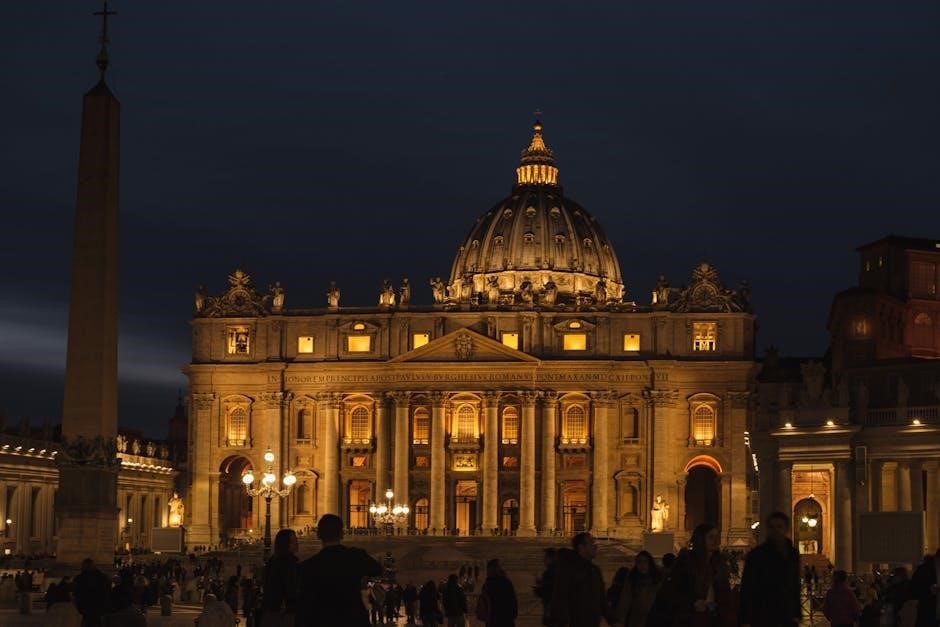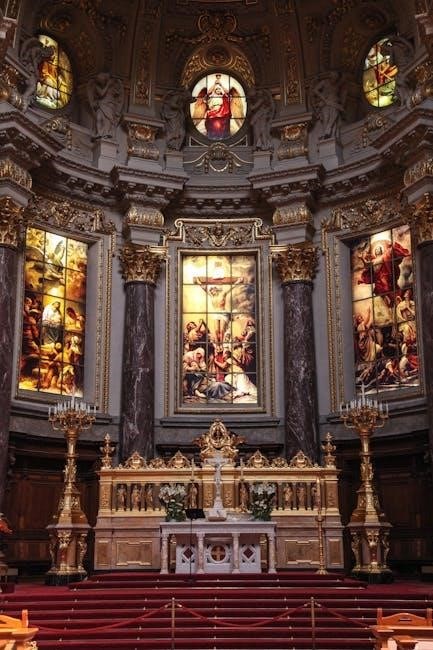Church history traces Christianity’s journey from Pentecost to the present, exploring its growth, challenges, and transformations. It provides insights into the Church’s origins, key events, and theological developments, offering lessons for modern believers while highlighting God’s enduring work through His people across centuries.
1.1 The Significance of Studying Church History
Studying church history is vital for understanding Christianity’s development and identity. It reveals God’s faithfulness, provides lessons from past successes and failures, and connects believers to a global, historical community. Church history preserves theological truths, demonstrates the Church’s resilience, and inspires faith by showing how God has worked through His people across centuries.
1.2 The Birth of the Church at Pentecost
The Church was born at Pentecost when the Holy Spirit descended on the Apostles, empowering them to preach and establishing the Christian community. This event marked the beginning of the Church’s mission, as recorded in Acts 2, and initiated the spread of Christianity. Pentecost is celebrated as the foundational moment of the Church, linking the promises of God in the Old Testament to the New Testament’s fulfillment through Jesus Christ.
1.3 The Apostolic Age and the Early Christian Community
The Apostolic Age (33-100 AD) saw the rapid spread of Christianity, led by figures like Peter, Paul, and other apostles. Early Christians formed a unified community, sharing beliefs and practices rooted in Jesus’ teachings. Conflicts arose, such as between Palestinian and Hellenistic Jews, but the apostles’ leadership and writings preserved the faith, laying the foundation for the Church’s growth and doctrinal clarity in the centuries to come.
The Apostolic Age (33-100 AD)
The Apostolic Age (33-100 AD) began with Pentecost, marking the Church’s birth. Apostles like Peter and Paul spread Christianity rapidly across the Roman Empire and beyond.
2.1 The Spread of Christianity in the Roman Empire
Christianity spread rapidly across the Roman Empire during the Apostolic Age. Apostles like Peter and Paul preached to diverse audiences, including Hellenistic Jews, leading to conversions and the establishment of churches. Despite conflicts between Palestinian and Hellenistic Jews, the Gospel reached beyond Jerusalem, with epistles and Gospels written by apostles, shaping the early Christian community’s identity and theology.
2.2 The Role of the Apostles: Peter, Paul, and Others
Peter, Paul, and other apostles played pivotal roles in shaping early Christianity. Peter, a prominent leader, preached at Pentecost and ministered to Jewish believers. Paul, a former persecutor, became a key missionary, spreading Christianity to Gentiles and writing influential epistles. Their teachings and missionary journeys laid the foundation for the Church, bridging Jewish and Gentile communities, and their writings form a significant part of the New Testament.
2.3 The Writing of the New Testament
The New Testament, written between 45-80 AD, includes the Gospels, Acts, epistles, and Revelation. Apostles like Paul, Peter, James, and John authored these texts, addressing early Christian communities. The Gospels narrate Jesus’ life, while epistles provide theological guidance and encouragement. These writings, inspired by the Holy Spirit, became the foundation of Christian doctrine, uniting believers and shaping the Church’s identity across generations.

The Middle Ages (100-1500 AD)
The Middle Ages saw the rise of the papacy, monasticism’s vital role in preserving Christianity, and the Church addressing heresy and schism, shaping its medieval identity.
3.1 The Rise of the Papacy and the Catholic Church
The papacy became central to the Catholic Church’s identity during the Middle Ages, with the pope emerging as the supreme spiritual authority. The Church solidified its influence through doctrinal developments, ecclesiastical councils, and missionary efforts. Monasticism flourished, preserving theology and education, while the Church addressed heresy and schism, reinforcing its institutional structure. This period laid the foundation for the Catholic Church’s enduring role in shaping Christian tradition and practice.
3.2 The Role of Monasticism in Preserving Christianity
Monasticism played a vital role in preserving Christianity by establishing communities dedicated to prayer, study, and service. Monasteries became centers for copying manuscripts, safeguarding theological works, and promoting education. Monks and nuns maintained liturgical practices, upheld moral standards, and provided spiritual guidance. Their dedication ensured the continuity of Christian traditions during periods of turmoil, fostering a steadfast commitment to faith and learning that shaped the Church’s enduring legacy.
3.3 The Challenges of Heresy and Schism
The early Christian Church faced significant challenges from heresy and schism, which threatened its unity and doctrinal integrity. Heresies like Gnosticism and Arianism questioned core beliefs, while schisms dividing the Church. Councils such as Nicaea and Constantinople addressed these issues, establishing creeds to define orthodoxy. These challenges tested the Church’s ability to maintain unity, ultimately leading to a stronger affirmation of its teachings and the preservation of its theological foundations.
The Reformation (1500-1700 AD)
The Reformation was a transformative period marked by theological disputes, leading to the emergence of Protestantism. Key figures like Martin Luther and John Calvin challenged Catholic doctrines, sparking significant religious and social changes across Europe, ultimately reshaping Christianity’s landscape and fostering diverse denominations.
4.1 The Causes and Key Figures of the Protestant Reformation
The Protestant Reformation emerged from widespread dissatisfaction with Catholic Church practices, such as corruption and the sale of indulgences. Key figures like Martin Luther, who sparked the movement with his Ninety-Five Theses, and John Calvin, who developed Reformed theology, challenged traditional doctrines. Their critiques led to theological debates, emphasizing justification by faith and Scripture’s authority, ultimately reshaping Christianity and giving rise to Protestant denominations that sought to reform the Church’s teachings and practices.

4.2 The Emergence of Protestant Denominations
The Protestant Reformation led to the emergence of various denominations, each shaped by distinct theological perspectives. Lutheranism arose in Germany under Martin Luther, while Calvinism spread across Europe through John Calvin’s teachings. Huldrych Zwingli influenced the Swiss Reformation, and Thomas Cranmer played a key role in England’s Anglican Church. Theological disagreements over sacraments, church authority, and predestination further diversified Protestantism, resulting in groups like the Anabaptists and Puritans. These divisions reflected differing interpretations of Scripture and regional cultural adaptations, ultimately enriching Christianity’s tapestry.
4.3 The Counter-Reformation and the Catholic Church’s Response
The Catholic Church responded to the Protestant Reformation through the Counter-Reformation, initiating reforms at the Council of Trent (1545-1563); This council reaffirmed Catholic doctrines, streamlined Church practices, and promoted theological clarity. The Jesuits, founded by Ignatius of Loyola, played a pivotal role in missionary work and education, countering Protestant influence. The Church also strengthened its authority through the Inquisition and supported Catholic monarchs to restore its dominance, ensuring the survival and renewal of Catholicism in a divided Europe.
Modern Church History (1700-Present)
Modern church history highlights evangelical movements, revivals, and global expansion. It addresses challenges like secularism and modernity while showcasing Christianity’s adaptability and growth worldwide;
5.1 The Evangelical Movements and Revivals
Evangelical movements and revivals, such as the 18th-century Awakening and 19th-century revivals, revitalized Christianity. Figures like John Wesley and Charles Finney emphasized personal conversion, evangelism, and social reform. These movements reshaped church practices, fostering missionary work and theological reforms. They also addressed societal issues like slavery and education, leaving a lasting legacy in modern Christianity’s global outreach and spiritual renewal. Church history highlights their transformative impact on faith and culture.
5.2 The Challenges of Secularism and Modernity
The rise of secularism and modernity brought significant challenges to the Church, as rationalism and scientific advancements questioned traditional beliefs. Declining church attendance and the erosion of religious authority marked this era. Cultural shifts, such as individualism and pluralism, further complicated the Church’s role in society. Despite these challenges, the Church adapted, engaging with modern thought while reaffirming its core teachings, ensuring its relevance in a rapidly changing world.
5.3 The Global Expansion of Christianity
Christianity’s global expansion accelerated in the 18th century, driven by missionary efforts and colonialism. Missionaries spread the faith to Africa, Asia, and the Americas, adapting practices to local cultures. Indigenous leadership emerged, blending traditional practices with Christian teachings. The translation of the Bible into native languages facilitated widespread adoption. This period marked Christianity’s transformation into a truly global religion, with diverse expressions and a universal message of hope and redemption.

Key Figures in Church History
Eusebius of Caesarea, known as the “Father of Church History,” and Philip Schaff, a renowned historian, have significantly shaped our understanding of Christianity’s past through their writings and research.
6.1 Eusebius of Caesarea: The Father of Church History
Eusebius of Caesarea, a 4th-century historian, is renowned as the “Father of Church History” for his seminal work The History of the Church, chronicling Christianity from the Apostolic era to 324 AD. His meticulous research and preservation of early Christian documents provide invaluable insights into the Church’s origins, key figures, and pivotal events. His work remains a cornerstone for understanding the early Christian movement and its development.
6.2 Philip Schaff: The Renowned Church Historian
Philip Schaff, a 19th-century theologian, is celebrated for his comprehensive eight-volume History of the Christian Church, spanning from apostolic times to the Reformation. His work is praised for its meticulous scholarship and balanced perspective, bridging the gap between historical research and theological insight. Schaff’s contributions have made him a foundational figure in church history studies, providing a rich resource for understanding Christianity’s development and legacy.
6.3 Modern Historians and Their Contributions
Modern historians continue to enrich church history studies through fresh perspectives and advanced methodologies. Scholars like Justo González and others have expanded understanding by integrating global contexts and diverse traditions. Their research bridges ancient and contemporary issues, offering deeper insights into Christianity’s evolution. Digital resources and collaborative projects further enhance accessibility, ensuring church history remains relevant and engaging for new generations of scholars and believers alike.
The Importance of Church History for Christians
Church history reveals God’s faithfulness, offering lessons from the past to guide believers today. It underscores the Church’s resilience and triumph, inspiring faith and unity among Christians.
7.1 Learning from the Past to Avoid Future Mistakes
Church history serves as a mirror, reflecting past successes and failures. By examining the triumphs and errors of earlier Christians, believers today can avoid repeating mistakes. This study fosters spiritual growth, unity, and wisdom, guiding believers to navigate modern challenges with insight and faithfulness, ensuring the Church remains steadfast in its mission and doctrine.

7.2 Understanding the Continuity of God’s Work
Church history reveals the unbroken thread of God’s work through the ages, from the early Church to modern times. It demonstrates His faithfulness in guiding His people despite challenges, preserving the gospel, and sustaining His Church. This continuity underscores God’s eternal plan and His ongoing presence, inspiring believers to trust in His sovereign purpose and remain faithful in their own time.
7.3 The Triumph of the Church Despite Challenges
Despite facing persecution, heresy, and societal shifts, the Church has endured, proving its resilience. Through centuries of trials, it has emerged victorious, fulfilling Christ’s promise to build His Church. This triumph reflects God’s faithfulness and the indomitable spirit of believers, ensuring the Church remains a beacon of hope and truth in an ever-changing world.

Available Resources for Studying Church History
Classic texts, modern PDFs, and online archives provide rich resources for studying church history. These materials offer detailed insights into historical events and theological developments.
8.1 Classic Texts and Historical Documents
Classic texts like Philip Schaff’s History of the Christian Church and Eusebius’s Church History are foundational resources. These works, available in PDF and other formats, provide detailed accounts of Christianity’s development. Historical documents, such as early church fathers’ writings and creeds, offer primary sources for studying key events and doctrines; These resources are essential for understanding the church’s origins, growth, and theological evolution over centuries.

8.2 Modern Publications and PDF Resources
8.3 Online Archives and Digital Libraries

Online archives and digital libraries offer unparalleled access to church history resources. Platforms like Google Books, archive.org, and institutional repositories provide digitized versions of rare manuscripts, historical documents, and scholarly works. These archives enable researchers to explore primary sources, such as Eusebius’ Church History and Philip Schaff’s volumes, with enhanced searchability and convenience, preserving the richness of Christian heritage for global accessibility and academic exploration.